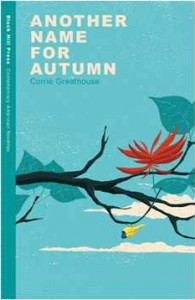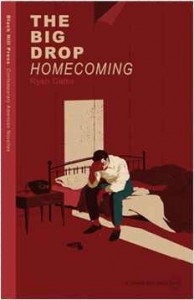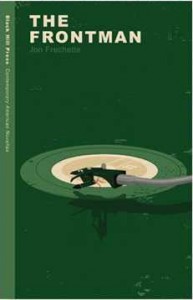LOVE LOST & FOUND: REVIEW OF THREE NOVELLAS
By Eveline Morel | March 12th, 2013 | Category: Book Reviews, Fiction, L.A. Art & Culture | 5 comments Paper Farms’ publishing debut features three novellas published under the Black Hills Press imprint. Defined as “a distinctive, mid-length fiction often overlooked as a literary genre,” the novellas have often fallen out of place, being too long to be a short story, and too short to be considered a full-blown novel. The three authors featured are L.A.-based writers: Corrie Greathouse, founding member of the Hollywood Institute of Poetics; Ryan Gattis, author of three novels, writing professor at Chapman University, and street artist; and Jon Frechette, filmmaker, screenwriter, musician, and former member of Noisegate, The three novellas are as distinctive from each other as their writers, with their own pacing, setting, and story lines. The unifying thread, however, is the universal theme of love—love lost and found—that each explores, in very different ways.
Paper Farms’ publishing debut features three novellas published under the Black Hills Press imprint. Defined as “a distinctive, mid-length fiction often overlooked as a literary genre,” the novellas have often fallen out of place, being too long to be a short story, and too short to be considered a full-blown novel. The three authors featured are L.A.-based writers: Corrie Greathouse, founding member of the Hollywood Institute of Poetics; Ryan Gattis, author of three novels, writing professor at Chapman University, and street artist; and Jon Frechette, filmmaker, screenwriter, musician, and former member of Noisegate, The three novellas are as distinctive from each other as their writers, with their own pacing, setting, and story lines. The unifying thread, however, is the universal theme of love—love lost and found—that each explores, in very different ways.
Another Name for Autumn by Corrie Greathouse transports the reader back and forth between Los Angeles and New England in a gentle, dream-like state as the main character finds a dream book in a hidden box in her closet and starts daydreaming about her life. There’s a wistfulness to the whole book, a certain pervading sadness, as the character wades through her memories of loss: the passing away of her mother, her father going away, and the parting with Finley. The book is a stream of memories, interwoven with quick narratives, detailed, colorful descriptions of scenery, and minute but important details. It’s more about loss and what happens than about the story; it’s about universal truths veiled in simple language that can be universally understood and felt: “When people go away, pieces of your heart fall out and there are holes where that person used to be. All you can do is try to pick them up and gather them into a mosaic—but you can never put them back in. Once pieces of your heart fall out, the shape of you changes and even if you pick them all up you can’t put them back.” The seasons, colors, weather, and sounds associated with the seasons play an integral part, as a bouncing board that reflects her inner journey and changes in her life.
The book perfectly captures what daydreaming is all about: quick snatches of color and details (empty bench, ivy-colored lampposts), meaningful interactions and dialogues, passing sounds, the softened edges and shapes, and the quick, smooth transitions between thoughts and memories. . . . Depending on the mood, towards the end, the reader might feel just a tad impatient with the main character, wishing that she’d somehow get it together, stop staring out the window, and just go outside, smell the sunshine, and see the ocean . . . But the end comes just in time, and the story ends on a positive note as the main character realizes that time heals all wounds and fills all holes, even in the heart.
 The Big Drop, by Ryan Gattis is an action-packed thriller, where the main character, Johnny Ban, seeks a missing woman who disappeared in L.A.’s Little Tokyo, not only to redeem his life and fulfill a mission, but for personal reasons, to re-establish ties with an old flame, the love of his life. The story starts off at the end, with Johnny’s seizure, concluding with a surprise ending, immersing the reader into a gritty universe of love, deception, war heroes, and gangsters, with a generous helping of violence, reminiscent of Manga comics and Tarantino movies. The book takes the reader on a tour of all the streets and hidden bars of Little Tokyo in fast-moving action and surprising twists and turns. The diverse characters of the story are reminiscent of comic book characters, action figures, each of them with a particular role and distinguishing marks. Both hero and heroine have their faces marked, from birth or life choices: Emi Sato’s vitiligo, the target of all school bullies, causes her to embrace violence and subsequent life-style; Johnny Ban’s disfigurement is a result of a bomb during the Iraq war. Johnny Ban is a conflictual mix of history and cultures, Japanese American, who lived in Japan most of his life, served in the U.S. army, both “the bomber and the bombed” aspects of his Japanese-American heritage. A great story about love lost and found, and how two misfits united through their differences are brought back together through improbable and violent means. The violence and fast-paced action is balanced by short, introspective pauses for reflection and quick trips down memory lane. The imminent truths spoken forth by various characters throughout the story add a small touch of universal wisdom as take-aways for the reader: “When a man packs too light, he carries too much baggage inside,” and “only piles of new hurts turn the old ones into joy”; or “Sometimes it’s o.k. to judge a book by its cover. You wouldn’t want to read everything.” The Big Drop delivers on all levels, and is just as good on the second read.
The Big Drop, by Ryan Gattis is an action-packed thriller, where the main character, Johnny Ban, seeks a missing woman who disappeared in L.A.’s Little Tokyo, not only to redeem his life and fulfill a mission, but for personal reasons, to re-establish ties with an old flame, the love of his life. The story starts off at the end, with Johnny’s seizure, concluding with a surprise ending, immersing the reader into a gritty universe of love, deception, war heroes, and gangsters, with a generous helping of violence, reminiscent of Manga comics and Tarantino movies. The book takes the reader on a tour of all the streets and hidden bars of Little Tokyo in fast-moving action and surprising twists and turns. The diverse characters of the story are reminiscent of comic book characters, action figures, each of them with a particular role and distinguishing marks. Both hero and heroine have their faces marked, from birth or life choices: Emi Sato’s vitiligo, the target of all school bullies, causes her to embrace violence and subsequent life-style; Johnny Ban’s disfigurement is a result of a bomb during the Iraq war. Johnny Ban is a conflictual mix of history and cultures, Japanese American, who lived in Japan most of his life, served in the U.S. army, both “the bomber and the bombed” aspects of his Japanese-American heritage. A great story about love lost and found, and how two misfits united through their differences are brought back together through improbable and violent means. The violence and fast-paced action is balanced by short, introspective pauses for reflection and quick trips down memory lane. The imminent truths spoken forth by various characters throughout the story add a small touch of universal wisdom as take-aways for the reader: “When a man packs too light, he carries too much baggage inside,” and “only piles of new hurts turn the old ones into joy”; or “Sometimes it’s o.k. to judge a book by its cover. You wouldn’t want to read everything.” The Big Drop delivers on all levels, and is just as good on the second read.
 The Frontman by Jon Frechette depicts the life of Will Jarrett, a thirty-something aspiring Brooklyn musician, as he struggles to build his music career and find true love. He meets a woman whose background and friends are worlds apart from his. He moves on, in search of his perfect ideal of “style and sensibility.” The story explores Will’s inner conflicts and pressure to make it as a musician as he becomes the frontman for a new band, the race against time, and how the love of playing music balanced against the desire for success. Counter this to Leah’s own quest for meaning as she tries to balance material success and true love. Both characters examine their own ideas of success and happiness through the twists and turns of their lives as they reconcile their respective dreams to what really matters in the end. The book offers a bona fide slice of Brooklyn musician hipster culture, complete with band and song references, deadpan humor, band appearances, rehearsals, after-parties, and band-member drama. The story could easily turn into a movie script, except for the well-turned phrases and self-realizations that provide added depth, inciting the reader to reflect on the possibility of true love: “The entire human race was driven by an impulse it was powerless against—not sex or love, but fear, the fear of being alone.” This is not just a love story, but also a “coming-of-age” story for the main character as he learns that “with every failure there is a chance of success,” and that love is more than “mediocrity and compromise.”
The Frontman by Jon Frechette depicts the life of Will Jarrett, a thirty-something aspiring Brooklyn musician, as he struggles to build his music career and find true love. He meets a woman whose background and friends are worlds apart from his. He moves on, in search of his perfect ideal of “style and sensibility.” The story explores Will’s inner conflicts and pressure to make it as a musician as he becomes the frontman for a new band, the race against time, and how the love of playing music balanced against the desire for success. Counter this to Leah’s own quest for meaning as she tries to balance material success and true love. Both characters examine their own ideas of success and happiness through the twists and turns of their lives as they reconcile their respective dreams to what really matters in the end. The book offers a bona fide slice of Brooklyn musician hipster culture, complete with band and song references, deadpan humor, band appearances, rehearsals, after-parties, and band-member drama. The story could easily turn into a movie script, except for the well-turned phrases and self-realizations that provide added depth, inciting the reader to reflect on the possibility of true love: “The entire human race was driven by an impulse it was powerless against—not sex or love, but fear, the fear of being alone.” This is not just a love story, but also a “coming-of-age” story for the main character as he learns that “with every failure there is a chance of success,” and that love is more than “mediocrity and compromise.”
Black Hills Press’s dedication to publishing the novella is perfectly suited to the busy, modern life-style of our day. The stories are long enough to present some complexity, and compact enough to spare the reader too much digression from the story path. The three novellas are worthy candidates for anyone with a free few hours, looking for a great read, and bring a renewed light to this forgotten literary art form.









[…] Eveline Morel, Editor of L.A. Art & Culture for Agenda Magazine reviewed the Mark Smith Collection / agendamag.com […]
[…] Love Lost & Found […]
Cheers, Eveline! Really appreciate the brilliant review. The Big Drop concludes next month with the release of IMPERMANENCE.
Hello, lovely people. This is Corrie Greathouse, the author of Another Name for Autumn. Thank you so, so much for the lovely review.
[…] the Mark Smith Collection, Another Name for Autumn, The Big Drop: Homecoming, and The Frontman / agendamag.com Literary Los […]